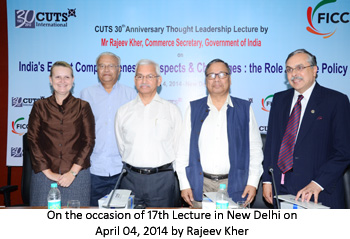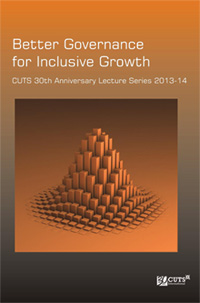To mark its 30th Anniversary, CUTS International organised a series of lectures around the world, including India, with eminent scholars and practitioners on topics of interest to go with CUTS' work agenda.
The lectures have been successfully organised in Kuala Lumpur, Jaipur, New Delhi, Geneva, London, New York, Washington DC, Nairobi, Lusaka, Accra, Islamabad, Canberra, Mumbai and Kolkata
CUTS believes that inclusive growth is about raising the pace of growth and enlarging the size of the economy, while levelling the playing field for investment and increasing productive opportunity. For that to happen on a sustainable basis and given the emerging challenges of development, CUTS advocates that there should be inter-disciplinary, network-based policy research and advocacy including capacity building of a diverse set of stakeholders on trade, regulation and governance.
The aim of the lecture series was to shape CUTS future interventions, which would help in promoting inclusive growth from the point of view of their impact on consumer welfare in the light of contemporary policy discourse on trade, regulation and governance. CUTS aims to publish lectures in a volume and produce a video tape of the same in mid-2014.
-
Key Messages
At New Delhi by Rajeev Kher
"India needs to mainstream its foreign trade policy with the governance system of the country so as to enhance its competitiveness in a holistic and dynamic manner," Rajeev Kher, Commerce Secretary, Government of India
At Lusaka by Caleb Fundanga
"Regional integration is an important factor in fostering competitiveness and ultimately efficiency among small and medium businesses," Caleb Fundanga, Former Governor, Bank of Zambia & currently President, Institute of Finance and Economics
At Canberra by Peter Varghese
"One can change a country by changing trade and industrial policy...Through a sustained domestic reforms programme for an open, market-driven economy, Australia has attained greater competitiveness and prosperity," Peter Varghese, Secretary, Department of Foreign Affairs and Trade, Government of Australia
At Mumbai by Rajiv Lall
"Economic Governance cannot be seen in isolation and would need to go hand in glove with political governance", Dr. Rajiv Lall, Executive Chairman, IDFC Ltd.
At Kolkata by Pranab Bardhan
"After its many failures, the centralised state everywhere has lost a great deal of legitimacy...A major dilemma of governance institutions in a developing country is a trade-off between autonomy and accountability, that is inevitably involved in most governance, including in the centralisation vs. decentralisation debate" - Dr. Pranab Bardhan, Professor of Economics at the University of California, Berkeley
"Decentralisation is yet to be achieved in India. Comparing India with China, he said that though China is not a democratic country, but has a more decentralised and accountable government. The delivery of service at local level is one of the main deciding factors in the recent elections in India" - Dr. Ajay Chhibber, Director General, Independent Evaluation Office
At New Delhi by Yashwant Sinha
''The Planning Commission is the biggest obstacle in the path of federalism. It should be restructured to do perspective planning and implementation without being empowered to micro manage the states' financing and functioning, which is the task of the Finance Ministry" - Shri Yashwant Sinha, MP & Chairman, Parliamentary Standing Committee on Finance
'Federal practices have not kept pace with changing dynamics and economic realities of the country. There was no credible and viable mechanism at present, for coordination between states and central government. The Interstate Council is defunct'' - Shri N K Singh, Member of Parliament
At Islamabad by Khurram Dastagir Khan
"Neighbours and boundaries cannot be changed, but mind sets will need to be changed...trade between India and Pakistan is a win-win situation for both the countries, as supported by studies done undertaken by CUTS and SDPI" - Khurram Dastagir Khan, Minister of State for Commerce and Textile Industry, Pakistan"
"Effective collaboration between Pakistan-India would be mutually beneficial...need for longer trading hours, opening of more border crossing points and that all trading points should be opened for all trading items" - Dr TCA Raghavan, High Commissioner of India to Pakistan
At New York by Jagdish Bhagwati, Eleanor Fox and Kevin Davis
"The multilateral trading system is dead and the Doha round is in trouble largely because of lack of US leadership" - Jagdish Bhagwati, University Professor, Columbia University
"Barriers can be created by various means and mechanisms, such as cartelization, public and private restraints and thus, it is important to empower the institutions to tackle such barriers. This, is one the key roles played by Competition Policy, which empowers people and institutions to access and benefit from economic opportunities, by bringing down such barriers" - Eleanor Fox, Walter J. Derenberg Professor of Trade Regulation, NYU
At Washington DC by Rakesh Mohan and Bill Kovacic
"By 2030, China's economy and by 2060, India's economy could be much larger than the economy of United States, if one goes by current projections. The rate of change that has been predicted, if it does come around, it would be quite dramatic in the next 20 years. These changes do indicate that changes at the level of global governance to have to happen, for example the emergence of G-20 countries, which is more participatory" - Rakesh Mohan, Executive Director, IMF
"Recruitment of the right people and the right level is one of the key ingredients to ensure success of a competition agency" - Bill Kovacic, Professor George Washington University
At Accra by Hanna S. Tetteh
"The short term pain that we have to bear in our bid to overcome the challenges of regional integration would lead to long term gain for everyone...We welcome the opening of the CUTS Centre in Accra and look forward to its active participation in providing research support to Ghana and the West African region on critical economic policy issues" - Hanna S. Tetteh, the Ghanaian Minister for Foreign Affairs and Regional Integration.
At Nairobi by Richard Sezibera
"Regional integration is one critical factor in efforts to achieve sustainable development in East Africa. This sustainability does not mean the maintenance of the status quo but should look at the long term development needs of the region. The region should integrate because it is the right thing to do at this time" - Ambassador Richard Sezibera, the Secretary General of East African Community (EAC).
At New Delhi by Salman Khurshid
"India needs to have a cognitive and accommodative conversation with China and called for an integrated approach towards engaging Asian countries to face the various economic, political and social challenges. The conversation should be accommodative from time to time with domestic need. India and China would work together one day but not today, as it's too early" - Salman Khurshid, External Affairs Minister
At London by Martin Wolf and Justine Greening
"Globalisation saw little reversal during the recent crisis mainly because of WTO, the role of social safety nets and the success of emerging economies in global trade, among others" - Martin Wolf, Chief Economic Commentator, Financial Times
"UK government and DFID firmly believe that trade will play a key role in poverty reduction and the developing countries should be helped to reap the benefits of free and fair trade"- Justine Greening, UK's Secretary of State for International Development
At Geneva by Pascal Lamy and Supachai Panitchpakdi
"There are parallels between the evolution of CUTS and the growth of the multilateral trading system over the last thirty years, in their quest to develop truly global organisations that are open to organic growth, reflecting the ever-changing global economy - Pascal Lamy, Director General of the World Trade Organization (WTO).
"Emerging markets which have successfully adopted the market economy have done so concurrently with the creation of strong competition regimes" - Dr Supachai Panitchpakdi, Secretary General of UNCTAD
At New Delhi by Montek Singh Ahluwalia
"The government has come out with twenty-five monitoring indicators to chart the country's inclusive growth over a period of time, the same will soon be available on the Planning Commission of India's website for public access" - Montek Singh Ahluwalia, Deputy Chairman of the Planning Commission of India.
At Jaipur by Nandan Nilekani
"It is not mandatory to have an Aadhaar card (like the enrollment under national population register, which determines citizenship ), the UID number will be a gateway to number of services like opening bank accounts, applying for passports, driving licences or LPG connections as the service providers will accept it as poof of KYC (know your customer) documentation" - Nandan Nilekani, Chairman, Unique Identification Authority of India.


